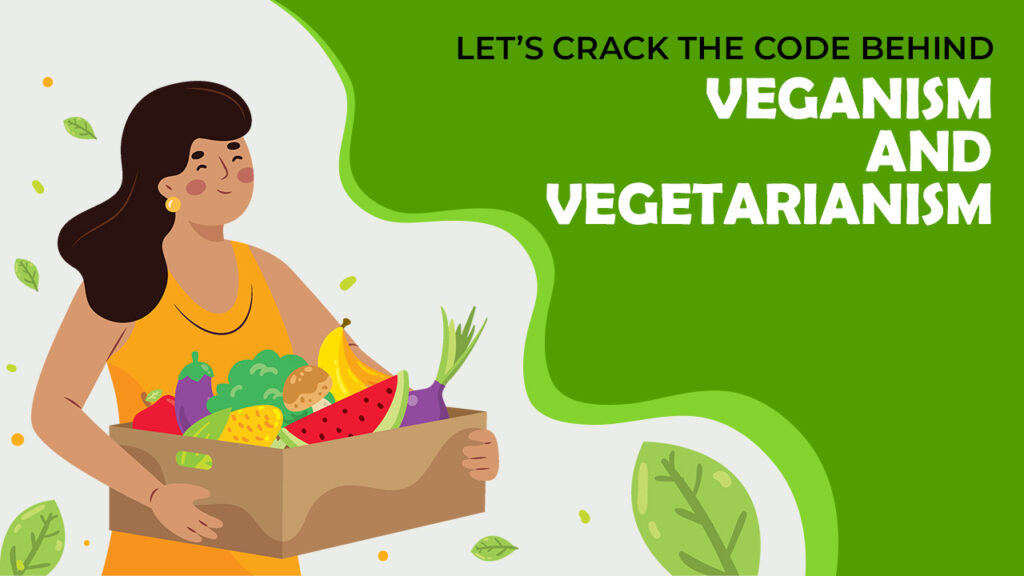
Let’s Crack the Code Behind Veganism and Vegetarianism

Let’s Crack the Code Behind Veganism and Vegetarianism
Introduction:
In recent years, there has been a significant rise in the number of people adopting alternative dietary lifestyles, driven by concerns for health, the environment, and animal welfare. Among these choices, veganism and vegetarianism stand out as two popular options. While they share similarities in terms of excluding meat from the diet, they differ in the extent to which animal products are eliminated. In this blog, we will explore the nuances and distinctions between being vegan and being a vegetarian, providing a clearer understanding of these dietary choices.

Vegetarianism: A Compassionate Culinary Journey
Vegetarianism is a dietary practice that excludes meat, poultry, and seafood from one’s diet. However, vegetarians often continue to consume other animal-derived products such as dairy, eggs, and honey. The motivation behind vegetarianism can vary, ranging from personal health reasons to ethical concerns about animal cruelty and environmental sustainability. Vegetarianism is a flexible dietary choice that allows individuals to find a balance between their dietary preferences and their ethical beliefs.
Veganism: A Lifestyle Committed to Compassion
Veganism goes a step further than vegetarianism by eliminating all animal products from one’s diet and lifestyle. This includes avoiding not only meat, poultry, seafood, and dairy but also eggs, honey, gelatin, and any other ingredients derived from animals. Vegans extend their commitment to animal welfare beyond their dietary choices and often avoid purchasing or using products made from animal sources, such as leather, fur, and cosmetics tested on animals. The core principles driving veganism encompass animal rights, environmental sustainability, and personal health.
Dietary Differences: Animal Products Excluded
The primary distinction between veganism and vegetarianism lies in the range of animal products excluded from each diet. Vegetarians abstain from meat and seafood but may still consume dairy, eggs, and other animal-derived products. Vegans, on the other hand, completely eliminate all animal-based foods, including dairy, eggs, and honey, opting for plant-based alternatives instead. This dietary choice requires careful consideration and planning to ensure adequate intake of essential nutrients like protein, iron, calcium, and vitamin B12, which are typically obtained from animal sources. Try Jibro Foods Valacha Vegan seasoning. Full of nutrients and flavours.
Health Considerations: Nurturing Well-being
Both vegan and vegetarian diets, when properly planned, can provide the necessary nutrients for a healthy lifestyle. However, vegans may need to pay extra attention to certain nutrients, such as vitamin B12, omega-3 fatty acids, iron, and calcium, as these are more commonly found in animal-based foods. Vegetarians, while still consuming some animal-derived products, may find it easier to meet their nutritional needs. Consulting with a healthcare professional or registered dietitian can be beneficial for anyone considering a vegan or vegetarian diet to ensure balanced nutrition.
Environmental and Ethical Impact:
Both veganism and vegetarianism promote a more sustainable and compassionate lifestyle. By reducing or eliminating animal product consumption, individuals can help decrease their ecological footprint, conserve water resources, mitigate deforestation, and combat climate change. Additionally, avoiding animal products supports the ethical treatment of animals by reducing the demand for factory farming and the associated cruelty.
Conclusion:
Veganism and vegetarianism are dietary choices that stem from various motivations, including health, animal welfare, and environmental concerns. While vegetarians exclude meat and seafood from their diet while still consuming some animal-derived products, vegans commit to eliminating all animal products from their diet and lifestyle. Both choices offer their own unique benefits and challenges, and individuals can find the one that aligns best with their beliefs and goals. Ultimately, adopting a vegan or vegetarian lifestyle can be a transformative journey that promotes personal well-being, animal welfare, and a more sustainable planet.


